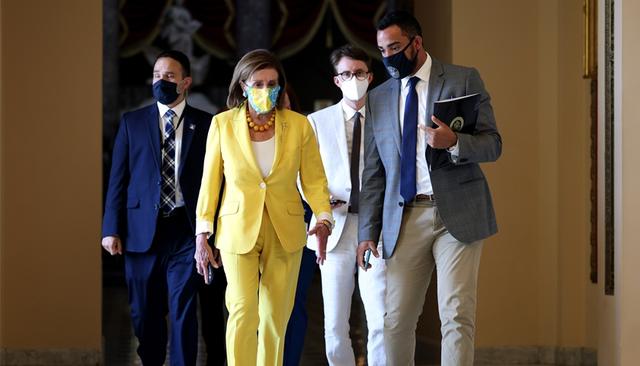House Speaker Nancy Pelosi yesterday kept her Democratic caucus together to advance the party's $3.5 trillion budget framework. But the hard work of deciding what exactly will be in that budget bill remains ahead. Pelosi herself nodded at some of the future challenges.
(SOUNDBITE OF ARCHIVED RECORDING)
NANCY PELOSI: This legislation will be the biggest and perhaps most controversial initiatives that any of us have ever undertaken in our official lives.
FADEL: Before members of the House left town, they also passed voting rights legislation named after the late Congressman John Lewis.
NPR congressional correspondent Kelsey Snell is here. Good morning.
KELSEY SNELL, BYLINE: Good morning.
FADEL: So, Kelsey, we spoke yesterday, and Democrats were stuck with moderates refusing to go along with Speaker Nancy Pelosi's plan to advance these bills. How did she get this massive budget framework to move forward?
SNELL: Well, Pelosi has been saying since June that there would be no vote on the bipartisan infrastructure bill until the Senate passed a separate $3.5 trillion partisan spending package. So centrists were willing — unwilling to sign on to that, and they successfully lobbied to get a specific date, September 27, as the official date that they will get a vote on the bipartisan bill regardless of what happens with that partisan bill. Now, that is a victory for them in the sense that they were able to separate the two issues and give themselves an opportunity to, you know, have a chance to vote on infrastructure if the Democrats are not able to come together on that very complicated process of writing $3.5 trillion of spending. But they used a lot of political capital to do that. And, you know, Pelosi has to satisfy moderates and progressives alike. And now progressives think they're owed something here, and that may make the next round of talks more complicated.

FADEL: So this, as you mentioned, is just one step. What's the path ahead?
SNELL: Well, now, as I said, they have to rewrite the bills. They have to work together. Moderates in the House and the Senate and progressives in both chambers have to write $3.5 trillion in spending. And that is going to be difficult because they have to agree on more than just the idea that they want to address climate change and education and paid family leave. They actually have to write the policies. And that's going to be a real test of Democrats' willingness to unify and President Biden's ability to kind of bridge differences within his own party to try to get to a deal. It will certainly be difficult. And, you know, members will be working together over the next month to do that.
FADEL: NPR's Kelsey Snell, thank you.
SNELL: Thanks for having me.












